For the 11th running of the Jamestown Double Beaver, race director Tim Dwyer decided to mix things up. No longer married to the “Jamestown”, “Double”, or “Beaver” parts of the name (the last two elements referring to the two passes by Beavertail Light), Tim briefly considered cutting all ties to the past by running it as a sled dog race. It was only after his wife patiently explained to him what “doggy paddle” actually meant that he decided to stick with humans. He did, however, migrate the venue to mainland Rhode Island (huh?) and shift the start time to late afternoon to maximize our chances for a downwind run.
While the wind did materialize, it brought along some unwelcome guests – lightning, rain squalls, and a newly-bald Chris Quinn (looking disturbingly fit). In the hour leading up to the start, the visuals to the north grew increasingly ominous, with a rumbling soundtrack designed explicitly to amplify our dread. Attempting to salvage a reasonably safe race, Tim cycled through course adjustments with wild-eyed fervor. From the original 9 mile triangle course, we progressed through countless variations before finally settling on a 5.5 mile sprint for survival. From our starting point at the University of Rhode Island (Go Quahogs!), we’d head up Narragansett Bay to turn on an abutment of the Jamestown Bridge, then return back to the start.
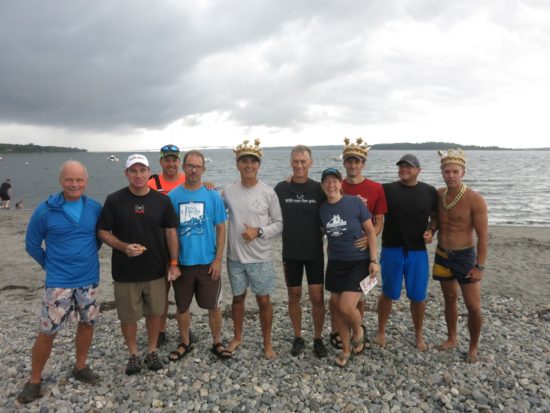
Only those paddlers categorized as “expendable” were allowed to compete this year.
Perhaps because of the dire forecast, turn-out for one of New England’s signature races was uncharacteristically low. Once we shooed away all the huskies, I mean. Only ten of us showed up, with one gentleman opting out after deciding that a 17% chance of electrocution was too high a price to pay for the chance at Double Beaver glory. Tim sweetened the pot by offering to rename the next year’s race in honor of anyone finishing in a literal blaze of glory, but that only resulted in the vainer of us affixing make-shift lightning rods to our PFDs.
Lining up for the start, the reason that Chris had shaved his head became obvious – he alone wouldn’t have to deal with the distraction of his hair standing on end. I said he alone. Wanting to give us as much of a safety buffer as possible, Tim quickly counted us down to a start. Although the first leg wasn’t a paddles-down kind of downwind, there were some decent waves to work with. Dave Grainger took advantage of the conditions to launch out of the gate looking strong, as did Tim and Wesley. A couple minutes into the race, I moved to the front of our increasingly spread-out group. This lead would last for about 90 seconds before Chris caught a nice series of runners and pulled ahead.
It took me the next half-mile to figure out that this was the new order of things. I wouldn’t be able to catch him on the downwind without wiping myself out for the return trip. I resigned myself to just trying to hang in his general vicinity until the bridge and then, er… paddling better? Shortly after this ego recalibration, I heard Tim yelling something from behind. A surprising amount of yelling goes on during our races, most of which I’ve found can be safely ignored. An element of panicked urgency in Tim’s voice suggested that I might want to pay attention, however. Upon tuning in, I discovered that he was amending the course yet again – perhaps to avoid the finale of the fireworks show that I had been hearing just over the horizon. Rather than turning on the bridge, we’d round a moored boat just a couple hundred meters ahead. The fact that it was necessary to relay this message to Chris didn’t reflect too well on my efforts to hang close to him. He took the turn about 10 lengths ahead.
I didn’t like my odds catching Chris by honorable means, so I decided to throw my lot in with the outgoing tide while he hung closer to the coast. In the face of inevitable defeat, it’s important to start lining up rationalizations as early as possible. This desperate measure would at least provide me with a flimsy “bad line” excuse for getting so soundly beaten. So here it goes… By keeping better tucked out of the wind rather than foolishly trying to exploit a meager tidal current, Chris extended his winning margin from 55 seconds to a full minute. Tim held off Kurt Hatem to claim third. The final course clocked in at just over 3.5 miles with the winning time measuring well under a half hour. Chris’ first surfski win was a convincing one. What better time to retire from the sport than while on top?
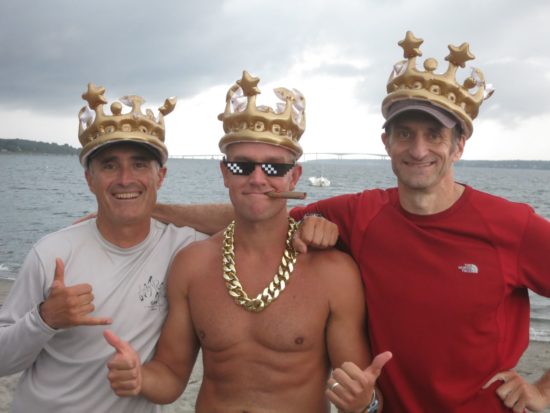
The photographer refused to take the picture until Tim and I had put our shirts back on.
Mary Beth’s win in the female division merits some additional coverage. In a scant field with less speed diversity than usual, she had fallen off the back of the pack. As a result, she neither heard about the route change nor saw anyone make the abbreviated turn. Famously, the same thing happened in the 2013 Double Beaver, where MB alone completed the original course. As the lawsuit to have her instated as the official champion of that race drags into its fifth year, this year’s repeat fiasco can only bolster her case (the term “depraved indifference” seems likely to sway a few jurors). Fortunately, this time Mary Beth figured out that everyone else had turned early, even though she didn’t know exactly where. Picking an arbitrary point well beyond the actual downwind terminus, she ended up paddling a 4.25 mile course. The excess will be credited to next year’s race. Additionally, Tim has decreed that all future Double Beavers must include a designated Course Adjustment Specialist assigned to apprise Mary Beth of the latest route alterations. As the person most likely to have to inform her parents should she be lost in Narragansett Bay, I suspect I’ll have to volunteer.
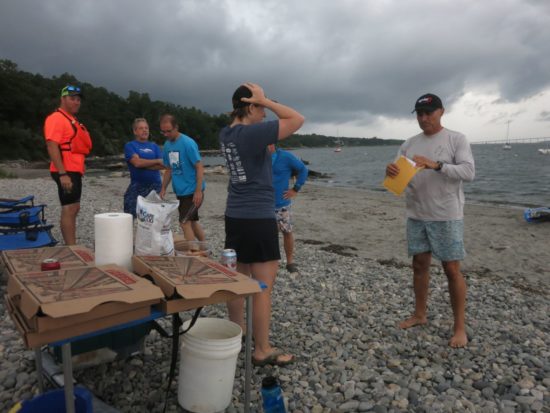
Mary Beth reacts to being informed that, once again, she’s been DQ’ed for course augmentation.
Tim’s decision to shorten the course exactly when he did makes me think he’s either a meteorological genius or a spooky clairvoyant. In any event, the timing of the event worked out perfectly. We tried out the new Stellar SEA that Dave Thomas had brought, stowed our boats, did the awards and the prize drawings, and were just finishing our pizza dinner when the skies opened up and deposited a swimming pool’s worth of rain on our beach. Fortunately, we could see the wall of water approaching across the bay, giving most of us time to avoid the deep end. Thanks to Tim (and to prize sponsor Epic) for a brief but memorable race.
Mike McDonough’s Nahant Bay Cup is this coming Saturday. There’s no need to sign-up beforehand – just register at Fisherman’s Beach in Swampscott between 8:30 and 9:30 for the 10 o’clock race.
[Note: Despite my jokes about the storms, we had forecasts and live radar indicating that the action wouldn’t reach our locale until well after we had completed our appointed rounds. In fact, even though it eventually rained at the venue, we never experienced lightning in the immediate area. In summary, we’re something short of suicidal maniacs.]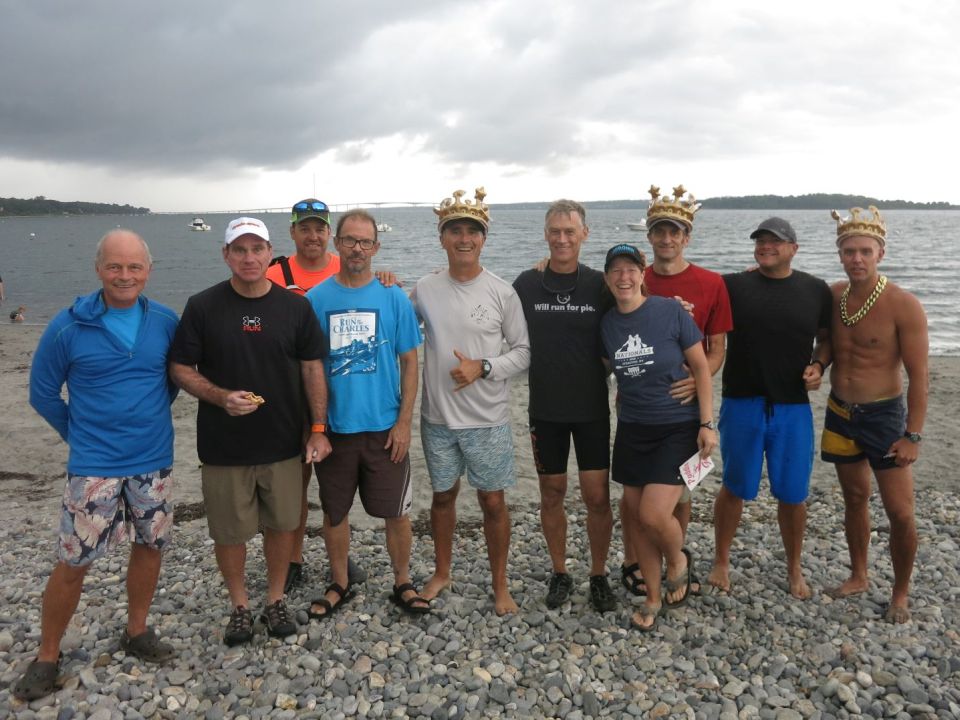
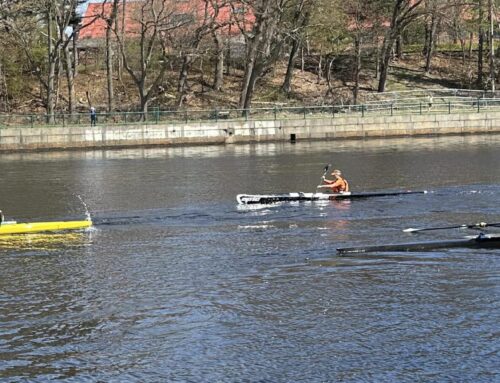
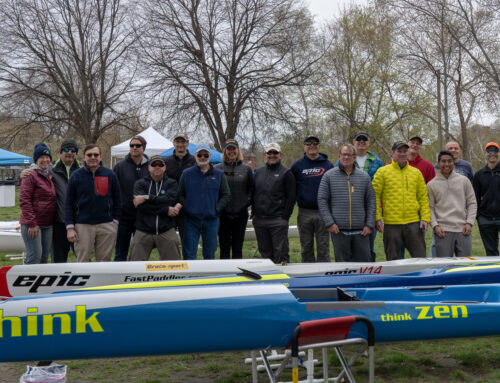
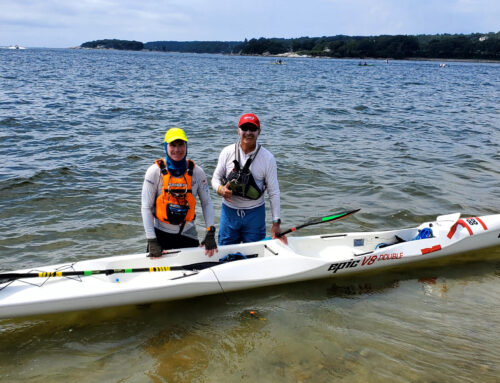
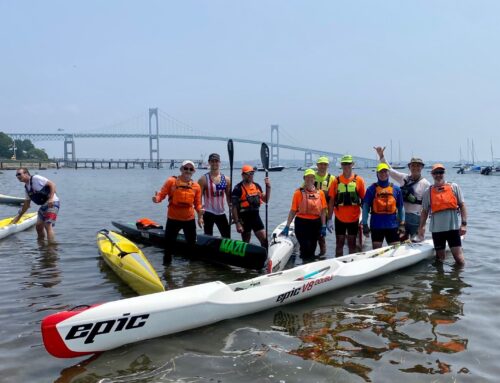
Leave A Comment
You must be logged in to post a comment.